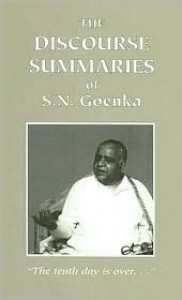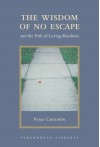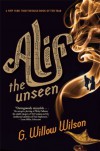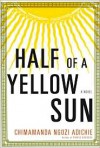Currently reading
The Wisdom of No Escape: And the Path of Loving-Kindness
River of Smoke: A Novel
Alif the Unseen
Half of a Yellow Sun
Taoist Qigong for Health and Vitality: A Complete Program of Movement, Meditation, and Healing Sounds
Sea of Poppies
AyurVeda: The Science of Self-Healing
Medicine Buddha Teachings
Tibetan Book of Living and Dying: The Spiritual Classic and International Bestseller
The Fault in Our Stars
Kundalini for Beginners
 I read all but the last two chapters of this before a ten day meditation retreat. I came back, finished it and promptly started to reread it.I can not say I understand everything that was said, nor can I wrap my head about the whole reincarnation business that is talked about within, but as an introductory book to a wholly unknown subject, it is fairly masterful. It got me really into the subject. And as it is something that, as the book repeats over and over again, must be experienced it has prompted me to go out and find other books that might allow me to understand kundalini more.It is clearly a spiritual path and Kumar makes it out to be a short path to transcendence, though filled with hard work. He described it in a clear way that has lead me to seek out a manual to help me find this path, as activating the serpent within the spine seems like something that one needs to experience to understand.And as this seems to have lots of health benefits, well.... sign me up.
I read all but the last two chapters of this before a ten day meditation retreat. I came back, finished it and promptly started to reread it.I can not say I understand everything that was said, nor can I wrap my head about the whole reincarnation business that is talked about within, but as an introductory book to a wholly unknown subject, it is fairly masterful. It got me really into the subject. And as it is something that, as the book repeats over and over again, must be experienced it has prompted me to go out and find other books that might allow me to understand kundalini more.It is clearly a spiritual path and Kumar makes it out to be a short path to transcendence, though filled with hard work. He described it in a clear way that has lead me to seek out a manual to help me find this path, as activating the serpent within the spine seems like something that one needs to experience to understand.And as this seems to have lots of health benefits, well.... sign me up.
The Discourse Summaries: The Tenth Day Is Over...
 I got this book mainly due to the glossary and translation of the Pali chants, as I was confused by what I had undergone at my 1st Vipassana course a year ago.And while they have been beyond valuable to me over the year since, the condensed discourses are really what this book is all about. They have helped me stay on the meditation path and with just finishing my second retreat, it has gone back into my bag I carry around everyday so that I can refer to it whenever any questions arise.Highly recommended to fellow vipassana folk.
I got this book mainly due to the glossary and translation of the Pali chants, as I was confused by what I had undergone at my 1st Vipassana course a year ago.And while they have been beyond valuable to me over the year since, the condensed discourses are really what this book is all about. They have helped me stay on the meditation path and with just finishing my second retreat, it has gone back into my bag I carry around everyday so that I can refer to it whenever any questions arise.Highly recommended to fellow vipassana folk.
alias Grace.
 This was a bit of a frustrating read. It is masterfully written, well if this was the 19th century. Atwood has done an incredible thing in morphing her writing to that of a 19th century romanticist. And while I can see just what a tough task this must have been, the resulting work is equally frustrating as it seems as hampered by the institutions of the age. Mostly, reading this only reinforced my feeling that reading fiction from this era is about as pleasing as gargling razor blades and tacks. The cultural repression is so caustic that the words just seems to irritate my eyes. The best part of the book is when Grace describes her childhood. Just like the best part of Jane Eyre is the first 10 chapters while she is a child. And while it was interesting to see where the story went, it was a very tough slog to get there.
This was a bit of a frustrating read. It is masterfully written, well if this was the 19th century. Atwood has done an incredible thing in morphing her writing to that of a 19th century romanticist. And while I can see just what a tough task this must have been, the resulting work is equally frustrating as it seems as hampered by the institutions of the age. Mostly, reading this only reinforced my feeling that reading fiction from this era is about as pleasing as gargling razor blades and tacks. The cultural repression is so caustic that the words just seems to irritate my eyes. The best part of the book is when Grace describes her childhood. Just like the best part of Jane Eyre is the first 10 chapters while she is a child. And while it was interesting to see where the story went, it was a very tough slog to get there.
The Yacoubian Building
 First this is really a 3.5 star book.I found my self a bit flummoxed by this book as I started. This was in no fault of the book or Al Aswany, but do to my own ignorance of the history of Egypt. This made the expository business of world building very difficult for me to grasp, as there is some degree of a basic understanding of Egyptian culture. But a few visits to Wikipedia and a few other web searches it made far more sense. Though it also became readily apparent that I have some serious holes in my history knowledge. This needs to be fixed.But once Al Aswany set up the characters and situations everything became so much easier to follow along with. But then there was the hammer of misogyny that seemed to be swung though out most of the narrative, so much that at times it seemed to knock over characters in other books I've read. I started to worry that this was Al Aswany rather than his chronicling the corrosive rejection of females in Egypt. And it nearly made me stop reading, but it was not present in every narrative and shown to be just an affect worn by nearly everyone in Al Aswany's Egypt.I forced my self to see this as a critique. But it was very hard to take.This is a novel about a city. He uses the Yacoibian building to present a cross section of all who live in Cario. And as others have written, even though this was written more than a decade before last year's awakening, it vividly highlights how it would have been impossible not to happen. One does not so much live a life as life in corruption in this novel. And it is a place where sin can easily be tolerated when it is taxed though bribes and the like. In fact Al Aswany makes his characters seem almost to be aquatic, only rather than water they exist in a liquefied corruption state.I would love to say his characters are fully formed and not really stereotypical, but that is not always the case. But he clearly favors those he develops most.If you are interested in having a better grasp on what the initial sparks that set off last year's revolution and why so much of Egypt is still fighting today for a proper free democracy, this seems like a good place to start. Though I warn you, the stench of boiled misogamy wafts off most pages so strong, it is often hard to see anything but it.
First this is really a 3.5 star book.I found my self a bit flummoxed by this book as I started. This was in no fault of the book or Al Aswany, but do to my own ignorance of the history of Egypt. This made the expository business of world building very difficult for me to grasp, as there is some degree of a basic understanding of Egyptian culture. But a few visits to Wikipedia and a few other web searches it made far more sense. Though it also became readily apparent that I have some serious holes in my history knowledge. This needs to be fixed.But once Al Aswany set up the characters and situations everything became so much easier to follow along with. But then there was the hammer of misogyny that seemed to be swung though out most of the narrative, so much that at times it seemed to knock over characters in other books I've read. I started to worry that this was Al Aswany rather than his chronicling the corrosive rejection of females in Egypt. And it nearly made me stop reading, but it was not present in every narrative and shown to be just an affect worn by nearly everyone in Al Aswany's Egypt.I forced my self to see this as a critique. But it was very hard to take.This is a novel about a city. He uses the Yacoibian building to present a cross section of all who live in Cario. And as others have written, even though this was written more than a decade before last year's awakening, it vividly highlights how it would have been impossible not to happen. One does not so much live a life as life in corruption in this novel. And it is a place where sin can easily be tolerated when it is taxed though bribes and the like. In fact Al Aswany makes his characters seem almost to be aquatic, only rather than water they exist in a liquefied corruption state.I would love to say his characters are fully formed and not really stereotypical, but that is not always the case. But he clearly favors those he develops most.If you are interested in having a better grasp on what the initial sparks that set off last year's revolution and why so much of Egypt is still fighting today for a proper free democracy, this seems like a good place to start. Though I warn you, the stench of boiled misogamy wafts off most pages so strong, it is often hard to see anything but it.
Butterfly Tattoo
 Not gonna lie, this was wholeheartedly disappointing.I was expecting the level of brilliance Pullman brought to His Dark Materials. And well this had none of that. It also lacked the charm and sense of wonder HDM provided.Yes, I understand this was written far earlier in his career, and did not expect it to be on par, but I am astounded by how lackluster this was. It is told in there sections. The first section had promise and lead me to think this was going to get much better. He introduced his main characters, and while none are who you want to be friends with, he filled them out and presented some motivations.Then it moved on to the 2nd & 3rd sections where Pullman became so overwrought in his writing, I had to think the editor fell asleep and left him to his ugly didactic ways. He makes Chris, the protagonist in the story so naive that he believes anything, with little hesitation. Quite a change in characterization, but fine. I can buy this. But then he turns around and presents him as a moral fundamentalist who can only see black and white answers to any solution. In doing so he stops accessing the grey matter in his head. These shifts are sloppy and nonsensical.I get that the lesson Pullman is trying to teach is that fundamental positions are dangerous to you and those around you. But he is a writer not a teacher. And I thought he was a skilled writer to achieve his goals without being sloppy and preachy about it, but this really proved me wrong.I honestly am not sure where he became a much better writer, because he so obviously did. The HDM series and Clockwork are fantastic books full of wonder and promise. This sadly has none of what made those such special reads.I guess this is encouraging, as it implies with enough practice and editorial help, one writing can improve exponentially. I guess this means I should perhaps look at later works of other authors I have dismissed as utter garbage, for perhaps they too will improve.
Not gonna lie, this was wholeheartedly disappointing.I was expecting the level of brilliance Pullman brought to His Dark Materials. And well this had none of that. It also lacked the charm and sense of wonder HDM provided.Yes, I understand this was written far earlier in his career, and did not expect it to be on par, but I am astounded by how lackluster this was. It is told in there sections. The first section had promise and lead me to think this was going to get much better. He introduced his main characters, and while none are who you want to be friends with, he filled them out and presented some motivations.Then it moved on to the 2nd & 3rd sections where Pullman became so overwrought in his writing, I had to think the editor fell asleep and left him to his ugly didactic ways. He makes Chris, the protagonist in the story so naive that he believes anything, with little hesitation. Quite a change in characterization, but fine. I can buy this. But then he turns around and presents him as a moral fundamentalist who can only see black and white answers to any solution. In doing so he stops accessing the grey matter in his head. These shifts are sloppy and nonsensical.I get that the lesson Pullman is trying to teach is that fundamental positions are dangerous to you and those around you. But he is a writer not a teacher. And I thought he was a skilled writer to achieve his goals without being sloppy and preachy about it, but this really proved me wrong.I honestly am not sure where he became a much better writer, because he so obviously did. The HDM series and Clockwork are fantastic books full of wonder and promise. This sadly has none of what made those such special reads.I guess this is encouraging, as it implies with enough practice and editorial help, one writing can improve exponentially. I guess this means I should perhaps look at later works of other authors I have dismissed as utter garbage, for perhaps they too will improve.
Geek Love
 I am very perplexed by this book. It took me over 100 pages to get into it. And in fact it was only when one of the Binewski's was injured by his younger brother that I started to take to it.I must say I was really into the characters, they were so oddly demented that their total unbelieveableness evaporated away. And this is my major problem with the book. The writing and story feels flimsy in comparison to these beings who cast shadows that would make mountains jealous. And perhaps this is an unfair complaint, as I have no idea how anyone could have constructed a narrative that would have been up to containing the Binewski family. So I am not singling out Dunn here, but it does not stop me from having wanted more from this book. It reminds me of that movie where Phillip Seymour Hoffman not only plays Capote, but simply becomes him. He was so transcendent in the role, the film itself was an afterthought and a disappointment. Nothing could withstand the impact of his performance. Likewise, nothing could withstand the hugeness, the uniqueness, the audacity, the insanity, etc etc of the freak show that is/was the Binewski family.While reading this, I told a friend this boiled down to the high concept of a mix of X-men and Easy Rider, if the mutants were side show carnival freaks and if Dennis Hopper was a Napoleonic megalomaniac with a thing for his sister/s and not prostitutes or pot. After finishing this, I am know this in no way captures the whole of the book, but I am more than happy to assert this in a Campbell's condensed soup sort of way.It is told from the perspective of the last surviving Binewski child. And like all first person narratives you have to weigh reality with this character's perspective. But since this book is basically about distilling the reality of an equally unreal traveling carnival, one does not doubt her as an unreliable narrator, as such. But her perspective, her love for her brother Artie does make you wonder just how much she leaves out to paint this rather vile human in a better light than the rest of the world would have. I am not saying she captures him with awe inspiring worship, she does not. Her words slaughter him and make his megalomania seem so horrific that you anticipate his assassination must lie on the next page. It just must. But I still wonder if her love for him colored his antics in a more positive way than others saw him. As I am just sure he was far more evil and cunning than her disturbed picture of him showed.I also found the "notes for now" chapters to be disjointed. Not so much as a narrative device, as I think they performed their task in that way well, but stylistically. They showed no difference in voice or style from the rest of the book which captured 20+ years ago. I found this odd and fairly unbelievable. In these chapters, Oly, the narrator, is describing her day to day breathing and not memory, yet they are presented in the exact same tongue. Highly unlikely....So I loved the characters. Would love to read more about so many of them, major and minor (and since others have said they will haunt you long after the book is over, I expect to see them in my dreams). But the book itself was a bit disappointing.
I am very perplexed by this book. It took me over 100 pages to get into it. And in fact it was only when one of the Binewski's was injured by his younger brother that I started to take to it.I must say I was really into the characters, they were so oddly demented that their total unbelieveableness evaporated away. And this is my major problem with the book. The writing and story feels flimsy in comparison to these beings who cast shadows that would make mountains jealous. And perhaps this is an unfair complaint, as I have no idea how anyone could have constructed a narrative that would have been up to containing the Binewski family. So I am not singling out Dunn here, but it does not stop me from having wanted more from this book. It reminds me of that movie where Phillip Seymour Hoffman not only plays Capote, but simply becomes him. He was so transcendent in the role, the film itself was an afterthought and a disappointment. Nothing could withstand the impact of his performance. Likewise, nothing could withstand the hugeness, the uniqueness, the audacity, the insanity, etc etc of the freak show that is/was the Binewski family.While reading this, I told a friend this boiled down to the high concept of a mix of X-men and Easy Rider, if the mutants were side show carnival freaks and if Dennis Hopper was a Napoleonic megalomaniac with a thing for his sister/s and not prostitutes or pot. After finishing this, I am know this in no way captures the whole of the book, but I am more than happy to assert this in a Campbell's condensed soup sort of way.It is told from the perspective of the last surviving Binewski child. And like all first person narratives you have to weigh reality with this character's perspective. But since this book is basically about distilling the reality of an equally unreal traveling carnival, one does not doubt her as an unreliable narrator, as such. But her perspective, her love for her brother Artie does make you wonder just how much she leaves out to paint this rather vile human in a better light than the rest of the world would have. I am not saying she captures him with awe inspiring worship, she does not. Her words slaughter him and make his megalomania seem so horrific that you anticipate his assassination must lie on the next page. It just must. But I still wonder if her love for him colored his antics in a more positive way than others saw him. As I am just sure he was far more evil and cunning than her disturbed picture of him showed.I also found the "notes for now" chapters to be disjointed. Not so much as a narrative device, as I think they performed their task in that way well, but stylistically. They showed no difference in voice or style from the rest of the book which captured 20+ years ago. I found this odd and fairly unbelievable. In these chapters, Oly, the narrator, is describing her day to day breathing and not memory, yet they are presented in the exact same tongue. Highly unlikely....So I loved the characters. Would love to read more about so many of them, major and minor (and since others have said they will haunt you long after the book is over, I expect to see them in my dreams). But the book itself was a bit disappointing.
Number9Dream
 While this was not as brilliant a read as Cloud Atlas, this has confirmed that Mitchell is one of my favorite authors.This is a hugely complex novel of proportions that I am fairly certain I do not even understand or recognize. The novel is set up with nine chapters with each one written/themed a bit differently. It was a bit disconcerting when I started chapter two, as I was wholly unaware of this, but once I figured out what was going on, I was totally game.At the core of this novel is catharsis. It is an adventure story, well if the adventure is even true, about the path one takes to grieve. As alluded to in the last sentence, the reader is left to juggle facts, that may or may not be true though out. And, with that comes having to decide which makes the most sense and what seems real. The title even incorporates the word dream within it, and the whole reading experience is more than a little dream like. And so as you read, you are forced to question if anything is real.This would normally lead me to want to drive spikes though my eyes. Mitchell takes this far above the realm of a stitch and fuses it with the vibrant life of organic story telling. Yes, I too was amazed he was able to do this - that anyone would be able to do this.
While this was not as brilliant a read as Cloud Atlas, this has confirmed that Mitchell is one of my favorite authors.This is a hugely complex novel of proportions that I am fairly certain I do not even understand or recognize. The novel is set up with nine chapters with each one written/themed a bit differently. It was a bit disconcerting when I started chapter two, as I was wholly unaware of this, but once I figured out what was going on, I was totally game.At the core of this novel is catharsis. It is an adventure story, well if the adventure is even true, about the path one takes to grieve. As alluded to in the last sentence, the reader is left to juggle facts, that may or may not be true though out. And, with that comes having to decide which makes the most sense and what seems real. The title even incorporates the word dream within it, and the whole reading experience is more than a little dream like. And so as you read, you are forced to question if anything is real.This would normally lead me to want to drive spikes though my eyes. Mitchell takes this far above the realm of a stitch and fuses it with the vibrant life of organic story telling. Yes, I too was amazed he was able to do this - that anyone would be able to do this.
Snakes and Earrings
 This book was free and only 120 pages. I figured it would be worth a read as the cover clearly states it won the Japanese award for best new literary talent.Um... Not so much.It took less than two hours to read, but I feel that every second I spent reading this I wasted and now have to live with the idea that I will never get them back. First, this book seems only about titillation. And I am for good titillation as the next person, but this is far from the good kind. This is nihilist desperate titillation, where feeling is entirely absent.I can only assume that the translation of this story removed enormous amounts of underlying meaning. Well at least I hope that, or 2004 must have been a fallow year for Japanese fiction for this to win anything.Avoid, unless detachment in every way, minus retinal, is your idea of a good time.
This book was free and only 120 pages. I figured it would be worth a read as the cover clearly states it won the Japanese award for best new literary talent.Um... Not so much.It took less than two hours to read, but I feel that every second I spent reading this I wasted and now have to live with the idea that I will never get them back. First, this book seems only about titillation. And I am for good titillation as the next person, but this is far from the good kind. This is nihilist desperate titillation, where feeling is entirely absent.I can only assume that the translation of this story removed enormous amounts of underlying meaning. Well at least I hope that, or 2004 must have been a fallow year for Japanese fiction for this to win anything.Avoid, unless detachment in every way, minus retinal, is your idea of a good time.
The Imperfectionists
 First, this is not a novel. I would not take any issue with that aside from that big glomming A Novel tag on the cover. This is a series of interconnected stories. They are very well done stories, but just because they circle the same sun, a newspaper, does not make this a novel.I was very smitten with this as I started reading it. It was cleaver and every character foible, slip up, or just plain mistake felt like a ringing metaphor for the impending death of print journalism. And while I in no way think Rachman recycled specific motifs to show this, it grew a bit tiresome over time. It felt old by the end, like people were saying goodbye to a sitcom you never watched rather than a good friend whose adventures you followed every day on page six.I really enjoyed how each chapter was broken up with short histories of the paper. Though I would have liked to see them interplay a bit more thematically with the modern day chapters, which focus directly on the current day and each from a different character's perspective.I found the most interesting chapter to be about a woman who read every issue of the paper like a novel. It took her days to read each one, and she was more than a decade behind in the news. There was actual plot development in her story, and she changed for the better. And while all the other characters as well, I can hardly say many did by choice or for the better. Now that I think about it, I like that the character I most care to know what happens in her future is just a reader of the paper. Even when the last physical paper shuts down, news readers will always have a future in other mediums. And I hope Rachman did this on purpose. It really works.Rachman's writing is pleasing, if nothing spectacular. His word play can not tie cherry stems in knots with its tongue, but it kept me engaged though out. And once I was into a chapter I rarely needed to come up for air.I think my main problem with this book is the single over riding metaphor it rests on. It is a balloon that is over inflated until it pops, yet there is about 80 pages yet to go.
First, this is not a novel. I would not take any issue with that aside from that big glomming A Novel tag on the cover. This is a series of interconnected stories. They are very well done stories, but just because they circle the same sun, a newspaper, does not make this a novel.I was very smitten with this as I started reading it. It was cleaver and every character foible, slip up, or just plain mistake felt like a ringing metaphor for the impending death of print journalism. And while I in no way think Rachman recycled specific motifs to show this, it grew a bit tiresome over time. It felt old by the end, like people were saying goodbye to a sitcom you never watched rather than a good friend whose adventures you followed every day on page six.I really enjoyed how each chapter was broken up with short histories of the paper. Though I would have liked to see them interplay a bit more thematically with the modern day chapters, which focus directly on the current day and each from a different character's perspective.I found the most interesting chapter to be about a woman who read every issue of the paper like a novel. It took her days to read each one, and she was more than a decade behind in the news. There was actual plot development in her story, and she changed for the better. And while all the other characters as well, I can hardly say many did by choice or for the better. Now that I think about it, I like that the character I most care to know what happens in her future is just a reader of the paper. Even when the last physical paper shuts down, news readers will always have a future in other mediums. And I hope Rachman did this on purpose. It really works.Rachman's writing is pleasing, if nothing spectacular. His word play can not tie cherry stems in knots with its tongue, but it kept me engaged though out. And once I was into a chapter I rarely needed to come up for air.I think my main problem with this book is the single over riding metaphor it rests on. It is a balloon that is over inflated until it pops, yet there is about 80 pages yet to go.
The Tanners
 Okay, this was one of the oddest experiences I have ever had with a book. And that is saying something.Walser has written the closet to the way I think that I have ever seen. So much closer than myself that is for sure. It was so close in fact that I had to take breaks from reading this to read other things as it felt like a sort of astral projection psychotherapy session that I was not sure I wanted.Walser's prose style is tangential and less than gripping. I say that not in a bad way, his words rappelled onto the page like those large glorious snow flakes that you only ever see every few years, the ones that look akin to cotton balls and the ones that hit your glasses like invisible water balloons. It is hard to keep up with it, it is so slight. I am fairly certain I have never read a writer so deft in slightness. And I would find myself having to read long passages again just to make sure both that I captured the meaning and to see just what I was missing. If I was missing anything. I kept finding that I was not, but am utterly convinced that I surely missed a lot.Some of Walser's paragraphs plod on like Henry James, but where his felt dense, as in having to rearrange the furniture in the room you are sitting in to make room for it, Walser's is airy in a way that shocked me. Shocked me in that it could be so simple. But just the same, Walser's paragraphs can run pages, and this makes it hard to keep up with the central thrust of his story, as they are peppered with tangents and the end hardly ever seems to play nicely with the beginning.I say this, not as much as a complaint as I found this book enjoyable, but as a warning to those who may find this off putting. Plot is not exactly The Tanners strong suit. It is all about the characters and how they unravel. How they exist. And their interactions. Though I have a theory that all the voices come from the main character's head and not from his siblings. But it would take too much time and effort to confirm this. A very strange and ultimately rewarding book. It is obviously not of this time, but eerily fits this time quite well.
Okay, this was one of the oddest experiences I have ever had with a book. And that is saying something.Walser has written the closet to the way I think that I have ever seen. So much closer than myself that is for sure. It was so close in fact that I had to take breaks from reading this to read other things as it felt like a sort of astral projection psychotherapy session that I was not sure I wanted.Walser's prose style is tangential and less than gripping. I say that not in a bad way, his words rappelled onto the page like those large glorious snow flakes that you only ever see every few years, the ones that look akin to cotton balls and the ones that hit your glasses like invisible water balloons. It is hard to keep up with it, it is so slight. I am fairly certain I have never read a writer so deft in slightness. And I would find myself having to read long passages again just to make sure both that I captured the meaning and to see just what I was missing. If I was missing anything. I kept finding that I was not, but am utterly convinced that I surely missed a lot.Some of Walser's paragraphs plod on like Henry James, but where his felt dense, as in having to rearrange the furniture in the room you are sitting in to make room for it, Walser's is airy in a way that shocked me. Shocked me in that it could be so simple. But just the same, Walser's paragraphs can run pages, and this makes it hard to keep up with the central thrust of his story, as they are peppered with tangents and the end hardly ever seems to play nicely with the beginning.I say this, not as much as a complaint as I found this book enjoyable, but as a warning to those who may find this off putting. Plot is not exactly The Tanners strong suit. It is all about the characters and how they unravel. How they exist. And their interactions. Though I have a theory that all the voices come from the main character's head and not from his siblings. But it would take too much time and effort to confirm this. A very strange and ultimately rewarding book. It is obviously not of this time, but eerily fits this time quite well.
Surfacing
 I went into this thinking due to its size and that it was from so early in her work that it would likely be a very good but likely a slight read. Man was I ever wrong.This is a masterpiece of epic proportions. And while it is a slim volume, it is no single way slight. I still feel as if I am breathing hard - trying to catch my breath - after finishing it days ago. Simply, the only slightness about this mesmerizing novel is that which any other book would feel standing upright with it on a book shelf.It has the acuity and precision of a Raymond Carver story, but this is also most grandiose in it's undertaking. And I am quite at a loss at just how those two go together, but Atwood pulls it off miraculously. She makes this near impossible task look effortless (though I am sure quite a bit of effort went into this).This is a book about duality. Even the title suggests it: something below trying to climb upward, above.It is about the ties to family.It is about the forces of hyper-modernity in post-war western society. The past pulsates through the book so vibrantly you can sense it trying to regulate the present. There is also the resigned fight against this desire. Not so much via heartened desire, but through a sense of obligation.Every element has an opposite in this book. And in presenting them, Atwood directs the reader to an unsatisfying equilibrium, and then lets the reader choose a side to root for, knowing this balance will never hold. Does one root for she or he, water or land, city or rural, primal or civilized, etc etc... Needless to say, any side a reader chooses is equally as unsatisfying. And maybe more so, as Atwood no longer directs here. This is a choose your own adventure that has no happy results. The cynic in me allows that this makes this read for more true to life, makes the connections to the story and characters far more visceral and real. The budding optimist in me wants to change the surface level of the water in the cup, forcing everyone to note it is far more than just half full, diverting attention away from the incorruptible facts in the story.Needless to say, this is not a happy tale. But this is an extraordinary achievement in writing. I keep going back to passages and tracking the progression of the main surfacing alluded to in the title, as each page seems to buoy up more things to the surface, and from the first page Atwood most aptly begins positioning everything for this moment. Damn near each breath the characters take seems to fill a balloon with air to help drag into position this new world.I am in awe of this book. But I am more in awe that I never see it mentioned when people discuss Atwood. Her later books seems to engulf all the praise people can spare. And while it would be wrong to say her most memorable/grandest works are her dystopian warnings - her works fall into no single genre, they seem to get the most press (especially The Handmaid's Tale right now, quite sadly for all the wrong reasons). But I keep saying that while this book is no dystopian epic of societal collapse, it surely fits into a category of emotional dystopia (which after reading this is a section in a book store/library I'd like to see).I also found that this early work telegraphs so many themes and ideas she further develops in he later work. And while some of them seem to be complete thoughts here, she re-interrogates them in future books, where she may not come to the same conclusions, but you find her answers just as satisfying. Obviously, I can not recommend this book more. It will linger for a long time after you close the final pages, bobbing up and down, drifting from your unconscious thoughts to the surface of your conscious ones.Go. Read. Now.
I went into this thinking due to its size and that it was from so early in her work that it would likely be a very good but likely a slight read. Man was I ever wrong.This is a masterpiece of epic proportions. And while it is a slim volume, it is no single way slight. I still feel as if I am breathing hard - trying to catch my breath - after finishing it days ago. Simply, the only slightness about this mesmerizing novel is that which any other book would feel standing upright with it on a book shelf.It has the acuity and precision of a Raymond Carver story, but this is also most grandiose in it's undertaking. And I am quite at a loss at just how those two go together, but Atwood pulls it off miraculously. She makes this near impossible task look effortless (though I am sure quite a bit of effort went into this).This is a book about duality. Even the title suggests it: something below trying to climb upward, above.It is about the ties to family.It is about the forces of hyper-modernity in post-war western society. The past pulsates through the book so vibrantly you can sense it trying to regulate the present. There is also the resigned fight against this desire. Not so much via heartened desire, but through a sense of obligation.Every element has an opposite in this book. And in presenting them, Atwood directs the reader to an unsatisfying equilibrium, and then lets the reader choose a side to root for, knowing this balance will never hold. Does one root for she or he, water or land, city or rural, primal or civilized, etc etc... Needless to say, any side a reader chooses is equally as unsatisfying. And maybe more so, as Atwood no longer directs here. This is a choose your own adventure that has no happy results. The cynic in me allows that this makes this read for more true to life, makes the connections to the story and characters far more visceral and real. The budding optimist in me wants to change the surface level of the water in the cup, forcing everyone to note it is far more than just half full, diverting attention away from the incorruptible facts in the story.Needless to say, this is not a happy tale. But this is an extraordinary achievement in writing. I keep going back to passages and tracking the progression of the main surfacing alluded to in the title, as each page seems to buoy up more things to the surface, and from the first page Atwood most aptly begins positioning everything for this moment. Damn near each breath the characters take seems to fill a balloon with air to help drag into position this new world.I am in awe of this book. But I am more in awe that I never see it mentioned when people discuss Atwood. Her later books seems to engulf all the praise people can spare. And while it would be wrong to say her most memorable/grandest works are her dystopian warnings - her works fall into no single genre, they seem to get the most press (especially The Handmaid's Tale right now, quite sadly for all the wrong reasons). But I keep saying that while this book is no dystopian epic of societal collapse, it surely fits into a category of emotional dystopia (which after reading this is a section in a book store/library I'd like to see).I also found that this early work telegraphs so many themes and ideas she further develops in he later work. And while some of them seem to be complete thoughts here, she re-interrogates them in future books, where she may not come to the same conclusions, but you find her answers just as satisfying. Obviously, I can not recommend this book more. It will linger for a long time after you close the final pages, bobbing up and down, drifting from your unconscious thoughts to the surface of your conscious ones.Go. Read. Now.
The Girl with the Dragon Tattoo
 Okay. I am very troubled by this book, as I think it covers some very important subjects that NEED to be more visible to make them go away for good. BUT, holy hell this book is at least 13 messes and 20 odd disasters entangled in some haberdashery of piss poor writing. Frankly, it is a good first draft that needed about 200 pages chopped out of it and quite fine tuning in style.This is bad, bad, bad writing. The single word I will think of when I think of Larsson will forever be didactic. He tells you what is happening, then tells you how you should feel about it. And while I very much agree with his conclusions, I adamantly disagree with the disrespect he shows for his readers' intelligence by feeling the need to pound his points in in such a way. If it is so vitally important to make a point for him, he should have insured his characters made it for him, not the unbodied narrator. One of the most egregiousness violations of this happens after the book's namesake character visits her mother. Her mom holds her hand extra long and does not want to let go. The reader understands that there is a very valid reason for this. But then Larrson commits a whole other paragraph to this: "It was as if she had a premonition of some approaching disaster."UM.... thanks for the hand holding! Totally unnecessary and downright patronizing. How any editor let this through is utterly beyond me.I had to put the book down when I came to this point. And I seriously questioned if I was going to pick it up again I was so distraught by this. But I had already invested nearly 400 pages into this, so I opted to finish.And what makes this extra frustrating is that this atrocious writing style is hinged on some fairly dynamic characters. These characters deserve so much more than this.In fact Lisbeth, the girl with the dragon tattoo, is a phenomenal character -- though she is more superhero than not, what with her photographic memory and physical abilities. And at first I was a bit put off on this. She was mostly believable, but obviously fiction. Then I came around to seeing her as being someone to aspire towards (well minus the emotionally distant business) and understood her importance and appeal a whole lot better. All my life I have been horrified at the violence and sexual abuse far too many of my female friends have endured. And Lisbeth to me seems to populate the world as an avatar of vengeance for the gruesome statistics Larrson peppers his chapter headings with (and the far too many other cases we know about and the many more we do not). She seems to begrudgingly take up this role, but by the end of the book her rage towards those who hurt women is so concentrated and totally understandable. For all of Larrson's writing faults, his creation of Lisbeth made trudging though this book worthwhile. And frankly was all that kept me from tossing it aside in disgust.When I finished I was equally curious about her further adventures. But the thought of wading through 2 more 500+ page books of Larrson's dynamically awful writing made me ever so thankful for wikipedia, where I could find out what happened next with out having to suffer though the literary equivalent of swallowing razor blades.There are quite a few pieces in this book that relate to a really good story, and is truly a story that so many more people need to know happens far too often, all over the world. But there is too much other fluff and didactic mockery going on to make it recommendable. And this makes me so sad, as with defter writing this would have been a magnificent source of learning.I hear the Swedish movies are quite good. So perhaps they can take the place of this feebly written book and help wake to world to the crisis that is violence against women & misogyny. Because god knows, we need ever opening we can get to help shift society on this one.
Okay. I am very troubled by this book, as I think it covers some very important subjects that NEED to be more visible to make them go away for good. BUT, holy hell this book is at least 13 messes and 20 odd disasters entangled in some haberdashery of piss poor writing. Frankly, it is a good first draft that needed about 200 pages chopped out of it and quite fine tuning in style.This is bad, bad, bad writing. The single word I will think of when I think of Larsson will forever be didactic. He tells you what is happening, then tells you how you should feel about it. And while I very much agree with his conclusions, I adamantly disagree with the disrespect he shows for his readers' intelligence by feeling the need to pound his points in in such a way. If it is so vitally important to make a point for him, he should have insured his characters made it for him, not the unbodied narrator. One of the most egregiousness violations of this happens after the book's namesake character visits her mother. Her mom holds her hand extra long and does not want to let go. The reader understands that there is a very valid reason for this. But then Larrson commits a whole other paragraph to this: "It was as if she had a premonition of some approaching disaster."UM.... thanks for the hand holding! Totally unnecessary and downright patronizing. How any editor let this through is utterly beyond me.I had to put the book down when I came to this point. And I seriously questioned if I was going to pick it up again I was so distraught by this. But I had already invested nearly 400 pages into this, so I opted to finish.And what makes this extra frustrating is that this atrocious writing style is hinged on some fairly dynamic characters. These characters deserve so much more than this.In fact Lisbeth, the girl with the dragon tattoo, is a phenomenal character -- though she is more superhero than not, what with her photographic memory and physical abilities. And at first I was a bit put off on this. She was mostly believable, but obviously fiction. Then I came around to seeing her as being someone to aspire towards (well minus the emotionally distant business) and understood her importance and appeal a whole lot better. All my life I have been horrified at the violence and sexual abuse far too many of my female friends have endured. And Lisbeth to me seems to populate the world as an avatar of vengeance for the gruesome statistics Larrson peppers his chapter headings with (and the far too many other cases we know about and the many more we do not). She seems to begrudgingly take up this role, but by the end of the book her rage towards those who hurt women is so concentrated and totally understandable. For all of Larrson's writing faults, his creation of Lisbeth made trudging though this book worthwhile. And frankly was all that kept me from tossing it aside in disgust.When I finished I was equally curious about her further adventures. But the thought of wading through 2 more 500+ page books of Larrson's dynamically awful writing made me ever so thankful for wikipedia, where I could find out what happened next with out having to suffer though the literary equivalent of swallowing razor blades.There are quite a few pieces in this book that relate to a really good story, and is truly a story that so many more people need to know happens far too often, all over the world. But there is too much other fluff and didactic mockery going on to make it recommendable. And this makes me so sad, as with defter writing this would have been a magnificent source of learning.I hear the Swedish movies are quite good. So perhaps they can take the place of this feebly written book and help wake to world to the crisis that is violence against women & misogyny. Because god knows, we need ever opening we can get to help shift society on this one.
The Tiger's Wife
 I quite enjoyed this book. Though after all the praise I have read that was heaped on it like frosting on a 27 layer cake, I expected to be blown away by it. I was not.That in no way implies that this is anything less than a very skillfully constructed first novel by someone with a true talent for storytelling. This is exactly what this is: a recasting of folk tales, village lore, and the trauma of war. And it is artfully done.It is a story of the -less, the deathless, the voiceless, the nameless, etc. It is the story of how secrets are shared and truths stretched. In some families say an uncle is the one who storytelling falls to. In Natalia's family everyone tells stories. But most of all, everyone else tells stories about them. Each of them are connected to the myth and legend of their unnamed Balkan city and the villages/towns the originate from.And from these stories bursts forth a mystery of why and how someone came to die in not a nameless town, but an unknown town. And this mystery is so enticing that as you navigate it, the stories told do not seem connected, you want bigger clues than metaphors and similes. You want fact rather than semaphore. But by the end you are glad you wrestled with the folklore to navigate the tributaries of thought going on within. It makes it far more rewarding to see the whole story after you have assembled it via story fragments into a whole cloth.At times I feel that Obreht was trying to reweave Yugoslavia back together with her stories and this is where I found her most difficult and her writing frustrating. Frankly, I do not think she set out to do this, but this is how her nostalgia in her stories at times comes off. I think she was attempting to demonstrate how new borders can not confine these stories, any more than the page. I think she was trying to show the ways the endless conflicts are a narrative into themselves that all sides share, just like the land that was once one. But I feel she was not especially successful in removing the gaze of desire from the past -- the it was so much better then.... -- from her nostalgia. And perhaps that is a fault of the nature story telling alone, but it still makes reading these passages difficult and feel a bit like a regression the rest of the book was so steadfastly opposed to.That said, I really enjoyed the book.Also, this is a call to all other novelists: more tigers within your stories please & thank you!
I quite enjoyed this book. Though after all the praise I have read that was heaped on it like frosting on a 27 layer cake, I expected to be blown away by it. I was not.That in no way implies that this is anything less than a very skillfully constructed first novel by someone with a true talent for storytelling. This is exactly what this is: a recasting of folk tales, village lore, and the trauma of war. And it is artfully done.It is a story of the -less, the deathless, the voiceless, the nameless, etc. It is the story of how secrets are shared and truths stretched. In some families say an uncle is the one who storytelling falls to. In Natalia's family everyone tells stories. But most of all, everyone else tells stories about them. Each of them are connected to the myth and legend of their unnamed Balkan city and the villages/towns the originate from.And from these stories bursts forth a mystery of why and how someone came to die in not a nameless town, but an unknown town. And this mystery is so enticing that as you navigate it, the stories told do not seem connected, you want bigger clues than metaphors and similes. You want fact rather than semaphore. But by the end you are glad you wrestled with the folklore to navigate the tributaries of thought going on within. It makes it far more rewarding to see the whole story after you have assembled it via story fragments into a whole cloth.At times I feel that Obreht was trying to reweave Yugoslavia back together with her stories and this is where I found her most difficult and her writing frustrating. Frankly, I do not think she set out to do this, but this is how her nostalgia in her stories at times comes off. I think she was attempting to demonstrate how new borders can not confine these stories, any more than the page. I think she was trying to show the ways the endless conflicts are a narrative into themselves that all sides share, just like the land that was once one. But I feel she was not especially successful in removing the gaze of desire from the past -- the it was so much better then.... -- from her nostalgia. And perhaps that is a fault of the nature story telling alone, but it still makes reading these passages difficult and feel a bit like a regression the rest of the book was so steadfastly opposed to.That said, I really enjoyed the book.Also, this is a call to all other novelists: more tigers within your stories please & thank you!
Half a Life
 This is my second Naipaul novel. And while I enjoyed his amazingly sparse prose here as much as I did in his earlier In a Free State, the story itself was not nearly as compelling. Naipaul is a master story teller, that is surely evident, as he makes you take note of exactly what develops in this atypical fish out of water scenario, but the characters are lacking depth to dignify much of a feeling one way or another for them.I quite enjoyed the use of parable like stories to make exacting points of the ever so boring characters, but these stories are far too brief and far too far apart from one another to make the rest of the novel a worthwhile read. The front cover also says this is Naipaul at his funniest, and it is true, he paints a very funny morose comedy of errors here, but he so obviously loathes the characters he is writing about, a blacker/bleaker humor would have seemed a bit more apt. And the characters are so serious and unable to laugh at all, let alone at themselves that the humor within is quite a challenge to sift thought at first. That is until it rears up like the cobra from the story that's venom will blind you from 15 feet.
This is my second Naipaul novel. And while I enjoyed his amazingly sparse prose here as much as I did in his earlier In a Free State, the story itself was not nearly as compelling. Naipaul is a master story teller, that is surely evident, as he makes you take note of exactly what develops in this atypical fish out of water scenario, but the characters are lacking depth to dignify much of a feeling one way or another for them.I quite enjoyed the use of parable like stories to make exacting points of the ever so boring characters, but these stories are far too brief and far too far apart from one another to make the rest of the novel a worthwhile read. The front cover also says this is Naipaul at his funniest, and it is true, he paints a very funny morose comedy of errors here, but he so obviously loathes the characters he is writing about, a blacker/bleaker humor would have seemed a bit more apt. And the characters are so serious and unable to laugh at all, let alone at themselves that the humor within is quite a challenge to sift thought at first. That is until it rears up like the cobra from the story that's venom will blind you from 15 feet.
Room: A Novel
 Simply put, this is a masterpiece. For sometime I have heard how good this was, but I was put off by the idea that it was in the voice of a five year old. This just seemed like the literary version of cloying and had bad Lifetime movie syndrome written all over it.Well, that concern was all for naught.The first 50 pages or so was a bit of an adjustment as the voice is very distinct, but it is also equally genius. Once I did get used to the voice, I simply could not put it down.From page one, the world within these pages is actualized with such an original voice that due to the circumstances of Jack, the narrator, sits back utterly detached to the brutality of his existence and provokes a true sense of fear in the reader that is echoed back in a gruesome joy and sense of wonder that could only be birthed in the kind of situation that makes up the premise of this book.And I find myself picking up this book a few times everyday since I finished it, just to see how Donoghue was able to craft such a successful voice. And really can not see myself stopping this for days to come. I can easily see it being adopted in creative writing classes everywhere, as it is a tour de force in crafting a mesmerizing distinct voice.And really that would have been enough for me to have enjoyed this book, but the characterization she is able to show with just dialogue from the other characters is equally impressive. Jack's mom, Ma, is a portrait in love for her child, her sacrifices for him are vast and all encompassing you can easily see she has determined that she will readily die for him. That Jack reports this, with out knowing the power of her willing sacrifices only heightens tragic elements of the story.Needless to say, this is a book that you should be reading, right now really.
Simply put, this is a masterpiece. For sometime I have heard how good this was, but I was put off by the idea that it was in the voice of a five year old. This just seemed like the literary version of cloying and had bad Lifetime movie syndrome written all over it.Well, that concern was all for naught.The first 50 pages or so was a bit of an adjustment as the voice is very distinct, but it is also equally genius. Once I did get used to the voice, I simply could not put it down.From page one, the world within these pages is actualized with such an original voice that due to the circumstances of Jack, the narrator, sits back utterly detached to the brutality of his existence and provokes a true sense of fear in the reader that is echoed back in a gruesome joy and sense of wonder that could only be birthed in the kind of situation that makes up the premise of this book.And I find myself picking up this book a few times everyday since I finished it, just to see how Donoghue was able to craft such a successful voice. And really can not see myself stopping this for days to come. I can easily see it being adopted in creative writing classes everywhere, as it is a tour de force in crafting a mesmerizing distinct voice.And really that would have been enough for me to have enjoyed this book, but the characterization she is able to show with just dialogue from the other characters is equally impressive. Jack's mom, Ma, is a portrait in love for her child, her sacrifices for him are vast and all encompassing you can easily see she has determined that she will readily die for him. That Jack reports this, with out knowing the power of her willing sacrifices only heightens tragic elements of the story.Needless to say, this is a book that you should be reading, right now really.
When God Was a Rabbit
 Sarah Winman is a voice to watch. This was a very good tale of things/people/experiences lost & found. It was an ambitious first novel and while mostly successful I found the main framing device, a before and after situation that Elly, the voice of the story, tells you will happen from the first line of the novel to be quite distracting and really lead to this reading as two novellas rather than a complete text.This speaks quite highly of the characters Winman creates as I wanted to know far more about their lives in the missing gap, as far too many huge developments are just hinted at, or even worse, just inferred.This shows that she has the chops to delve into large scoped stories in the future and I await what she does next. But mostly I want to know these characters she creates and meet them for tea every few months and am quite sad they are fictional and likely are never to be heard from at all.
Sarah Winman is a voice to watch. This was a very good tale of things/people/experiences lost & found. It was an ambitious first novel and while mostly successful I found the main framing device, a before and after situation that Elly, the voice of the story, tells you will happen from the first line of the novel to be quite distracting and really lead to this reading as two novellas rather than a complete text.This speaks quite highly of the characters Winman creates as I wanted to know far more about their lives in the missing gap, as far too many huge developments are just hinted at, or even worse, just inferred.This shows that she has the chops to delve into large scoped stories in the future and I await what she does next. But mostly I want to know these characters she creates and meet them for tea every few months and am quite sad they are fictional and likely are never to be heard from at all.












